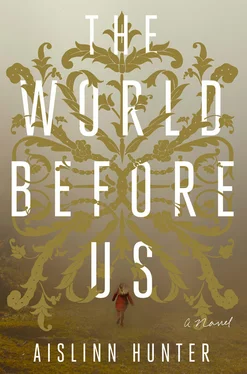The research probably saved him. When Jane saw The Lost Gardens of England on the shelf in the museum shop she imagined the writing of it would have been a kind of solace. There’d have been little room for Lily in a book on plant hunters of the nineteenth century, in the classifications of species, in letters and dispatches from Ningpo or the Casiquiare River, the descriptions of Amaryllis and Lobelia shipped back from the Cape. So she had conceived of the book as a kind of escape for him — until two weeks ago when she read it and got to the last chapter on George Farrington and the alpine gardens he’d planted up north, and realized that to write that chapter William must have had to visit the estate again, to drive up from London on the same road he and she and Lily had taken together and to canvass the trail at Inglewood much as he’d been doing when Lily disappeared.
Jane puts her hands on the railing to steady herself, and one of the schoolgirls below, a blonde with pencilled eyebrows and a long aristocratic nose whom Jane has been absent-mindedly staring at, gives her the two-fingered salute and then stalks off toward the Nelson cabinet. In a few hours she and all the other visitors will be gone, and Jane will be standing in a black dress by the door, greeting guests, greeting William. For years she has imagined his life, how it must have changed, what it must be like now: the compactness of it, the self-imposed isolation — like the shells in the Moore collection, something small and hard a body could curl into. A lump rises in her throat when, descending the stairs, she realizes that it’s not really his life she’s been imagining, but her own.
From a distance, patterns are easy to discern and people are predictable. Most have a habit of circling back to what they know, to places that feel safe and familiar. Over the past eight years we’ve come to know what Jane will pay attention to when she walks through the museum: which cabinets she will ignore, which ones she’ll gaze at, which she’ll open. But the past six weeks have changed everything. Her movements and intentions are affected by collections going up for auction, by the need to assemble documents according to other people’s schedules, by the fact that William Eliot will be here giving a talk about his book. Jane is thinking less about us, and more about him because of this.
Until the announcement of the museum’s closure, our lives followed patterns of their own. We acknowledged each other as fellow passengers might do, like commuters on a train. We took up watch over Jane in shifts, sailing past each other almost wordlessly. This was partly because it’s easier to keep track of each other when there are only four or five of us in a room, but also because watching Jane isn’t easy. When Jane drops honey into her tea, some of us gaze at the spoon and yearn to taste what it carries; when she puts her hands over her mouth and begins to cry, there are those of us who ache to comfort her. Watching her work has always been best — there is possibility in it, in hovering around her, hanging over our own hoped-for histories like question marks. Keep going , we’d say. Open that file; look there . Sometimes we thought she heard us. Especially on those days when she turned her attention back to N and the Whitmore, when she sent out inquiries, dug into the archives, asked the right questions, when she gazed, as she did this morning, at the galvanizing machine and thought about Leeson, or dreamed of the woods — instances that allow us to say, Yes, that is close to what happened . But sometimes her papers got shuffled around or were crumpled into the wastebasket; sometimes days went by without Jane giving a thought to us, and so we’d grow restless, argue about what we were doing here and if we should leave, as if what concerned one of us concerned us all.
Even though it is not allowed, we know that we can flutter Jane, that there are ways we can effect change. A month ago, when she heard that William had won the Chester-Wood Prize and would be reading at the award ceremony, she spent a whole night staring through the dark at the ceiling. At half-five in the morning she got out of bed, threw on jeans and a jumper and took the tube to William’s house with the idea that seeing him beforehand was the only reasonable solution. She stood at the bottom of the walk for half an hour, thinking he’d step out to go to work, or that he’d notice her from the front window, be the one to come outside, that he’d know what to do. But then an upstairs light came on, and Jane lost her nerve. So we started wishing her up the steps, willing her toward the pearly circle of his door chime.
Morality is not solely the terrain of the living — we argued about what we were doing as it was happening, unsure if what was good for us was good for Jane. Still, we wanted her done with it, we wanted her attention back on us, so we gathered together in the blue curl of morning, put our hands out and thought Jane forward as hard as we could. There were whole seconds when it seemed she might go, when she lifted her foot onto the next step, reached out her hand.
“This is it,” we said. And in our excitement we lost our concentration, saw her shake her head and turn around. Watched the wrought-iron gate swing closed behind her.
Sometimes when we are brooding, when our own progress seems blocked, we turn our backs on Jane and her work, on the museum things we’ve come to love, and look for distraction. We sprawl on the roped-off furniture in the upper galleries, watch people pee in the loo, follow random strangers, wander outside the building. Some of us have braved travel and left the city, some have even given up — were here one day and then wavered like light on water and vanished the next. On the bad days we leave Jane to her work, drift aimlessly past cabinets and museum visitors or wander up to the second-storey gallery windows. Once there, we stare out at the brusque efficiency of a city going about its business — the awnings rolling up and down over the shops near the corner, umbrellas opening and closing, people’s clothing changing weight and shape with the season — so that when we shake our heads to clear the dream, we sometimes find weeks have gone by in a flickering instant. We have come to think of time the way we think about the museum: that being inside it is like inhabiting the past, the present and the future simultaneously. This is why we have to stay awake, be vigilant: we need to believe that we, like the museum objects around us, bear time with equal complexity, that eventually we might discover who we have been, what purpose we serve and what use we might one day be.
At four o’clock, Jacek, the museum’s security guard, places a wrought-iron stand with a Closed sign outside the front door, and the last patrons, a group of well-heeled elderly ladies and an American family carrying shopping bags, begin circulating quickly through the collections. An hour later the caterers come in through the loading bay and begin setting up in the corner of the natural history hall. By the time the final visitor, a Japanese girl picking through the discount postcards in the gift shop, has made her way out, a long table draped in linen has been set up and a raised stage and podium erected at the back of the room.
Jane comes out of her office just as the musicians arrive. They set down their instrument cases to rearrange the chairs and music stands placed on the dais, one of the young men bumping into the tortoise display behind him when he bends to pick up his violin.
The main hall is the kind of impressive room Edmund Chester dreamed about: his whale skeleton is suspended between four marble columns and the ceiling is painted blue above it, so that looking up at its bowed jaw and notched spine you can almost imagine it whole, see it steering itself across the ocean. The cabinets and long-cases that line the west wall are accordingly nautical in theme: turtle collections, navigational instruments, a display of fossils brought back on the Beagle . The cabinets on the opposite wall contain flora and fauna. The largest, the Vlasak cabinet, is an old oak hutch filled with a variety of plant models made entirely from glass: moss, fern leaves, pine and cypress cones, lace vine, a rose replete with thorns, a sprig of wild strawberry.
Читать дальше












